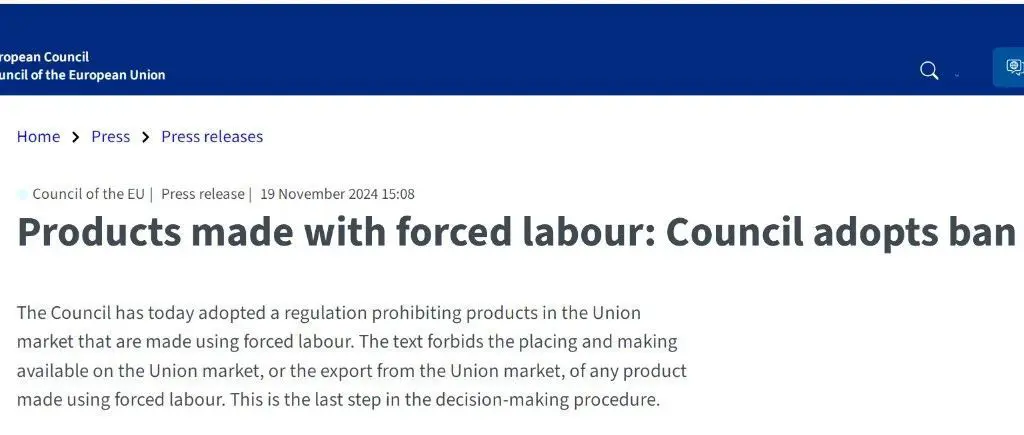Xie Bo, Li Ziyi | The Impact of the EU Market Ban on Forced Labor Products on China and Countermeasures
On [date], the European Council finally adopted the "Regulation on Prohibiting Products Made by Forced Labor in the EU Market" (hereinafter referred to as the "EU Anti-Forced Labor Regulation" or the "Regulation"). After being signed by the President of the European Council and the President of the European Parliament, the Official Journal of the European Union published the new EU regulation ("Forced Labor Regulation") on [date] of the same year, which prohibits the sale of goods made using forced labor in the EU market. Starting from the end of [year], this regulation will affect businesses selling any goods to or from the EU. The regulation uses so-called "forced labor" as a tool, but in reality emphasizes supply chain control. In the context of economic globalization, the introduction of this regulation may, to some extent, create new trade barriers, thereby triggering trade frictions and disputes. Our country should prudently respond to the implementation of the regulation, actively participate in global rule-making, and, more importantly, safeguard our own security and development interests.

A Brief Analysis of the "EU Anti-Forced Labor Regulation"****《条例》旨在禁止在欧盟市场投放、提供,以及从欧盟出口使用“强迫劳动”生产的产品。根据《条例》,强迫劳动的定义与国际劳工组织(ILO)第29号强迫劳动公约一致。值得注意的是,在“强迫劳动”中,特别加入“国家当局实施的强迫劳动”,其主要关注点涵盖以下内容:一是未经个人自愿同意且无法离开的工作或服务。“强迫劳动”强调个人在非自愿的情况下被迫提供劳动力,尤其是在暴力、胁迫、威胁或欺诈下完成的工作;二是直接或间接涉及“强迫劳动”的商品生产链,。论强迫劳动发生在生产的哪个环节,只要涉及到产品的供应链(例如原材料采购或最终制造),其相关产品均受《条例》约束;三是针对弱势群体的剥削行为。《条例》特别关注针对儿童和移民工人的“强迫劳动”,强调对这些群体的保护;四是国别和地区的全面适用。《条例》适用于所有进入欧盟市场的产品,不区分其来源地,既包括欧盟境内生产的商品,也包括从第三国进口的商品;五是供应链尽职调查要求。《条例》明确要求企业对自身的供应链进行尽职调查,以确保其商品不涉及“强迫劳动”行为。在《条例》正式出台前,欧盟已出台如《企业可持续性尽职调查指令》(CSDDD)和《欧盟零毁林法案》(EUDR)等法规,旨在加强企业在环境、人权等问题上的责任。美国于2022年6月正式实施《维吾尔强迫劳动预防法案》(UFLPA,简称《涉疆法案》),禁止与新疆相关的“强迫劳动产品”进入美国市场。作为全球另一重要经济体,欧盟显然受到该法案的影响,表面上强调人权和劳动权益,实际上是为实施贸易保护主义提供借口,通过非关税壁垒阻碍中国出口产品进入欧盟市场,破坏中欧间长期形成的经济合作关系,加剧全球供应链分裂,对经济全球化和国际贸易稳定性造成不良影响。以《条例》为基础,未来欧盟还可能进一步扩展和深化相关法律框架,以应对所谓人权、可持续发展、环境保护等综合性议题。例如,出台更加细化的法律框架,要求企业不仅针对强迫劳动,还需对所有人权相关风险进行全面评估和管理,以进一步增强企业社会责任。同时涵盖更多形式的劳动剥削,这种立法趋势将不仅局限于禁止强迫劳动,还可能推动对“体面劳动”更高标准的要求。鉴于供应链的全球化特性,欧盟可能还会推动与美国及其他经济体的协调,形成统一的强迫劳动产品禁止标准。

2. The Potential Impact of the EU Anti-Forced Labor Regulation on China******(一)对相关产业链供应链形成直接冲击The European Union is one of China's major trading partners, and China exports a large volume of products to the EU annually, including textiles, electronics, chemicals, and more. The "Regulation" stipulates that products involving so-called "forced labor" are prohibited from entering the EU market, which will undoubtedly pose challenges to Chinese enterprises reliant on exports. Firstly, there will be an increase in the cost of supply chain due diligence. The so-called "forced labor" does not exist in China at all; it is entirely a malicious fabrication by anti-China forces. The Regulation unreasonably requires companies to provide proof of supply chain compliance, forcing them to trace every link to prove their innocence and provide so-called compliance proof, which is undoubtedly a waste of human, material, and financial resources, compelling companies to invest more unnecessary costs. Secondly, specific industries may face trade barriers. The supply chains of industries such as textiles, mining, and agriculture have always been regarded as "high-risk" areas by international NGOs and media, especially enterprises involved in Xinjiang cotton and minerals may face direct trade restrictions. Thirdly, the trend of "de-Chinafication" of supply chains is intensifying. As China occupies a central position in manufacturing and supply chains, EU enterprises may face increased costs and decreased efficiency when replacing Chinese supply chains. In the long run, the Regulation may prompt more countries to adopt policies similar to those of the EU, further squeezing China's role in the global industrial and supply chain. The implementation of the Regulation will further drive this trend, potentially leading international companies to be more cautious in cooperating with Chinese suppliers, or even adopting a "de-Chinafication" strategy in their supply chains.(二)导致中欧全面经济竞争和经济问题政治化In recent years, the European Union has accelerated its strategy to revive local manufacturing and achieve technological autonomy, as seen in initiatives like the European Green Deal and the Digital Markets Act. Through these regulations, the EU not only aims to enhance control over its own market but also seeks to indirectly weaken China's position as the "world factory," which is essentially a significant manifestation of economic competition. The EU tightly integrates environmental protection, sustainable development, and human rights issues with trade policy, erecting trade barriers based on "green standards" and "ethical standards." This is not only an economic tactic but also a competitive strategy targeting export-oriented economies like China, aimed at boosting the competitiveness of EU industries. In fact, the introduction of these regulations reflects the EU's approach of "over-politicization" and "over-securitization" in economic and trade issues, which may exacerbate tensions between the EU and China. Although the regulations nominally target global forced labor, in practice, the EU may focus on specific regions (such as Xinjiang, China) for monitoring and risk assessment through reports from NGOs, media, and other stakeholders. This will further politicize economic issues and may even evolve into interference in China's internal affairs. Such tensions could spread to other areas like diplomacy, technology, and culture, negatively impacting the comprehensive strategic partnership between China and the EU and hindering cooperation and coordination in international affairs. This move by the EU may also prompt other countries and regions to follow suit, triggering a wave of trade protectionism against China and further intensifying the fragmentation and instability of the global trade landscape.(三)配合美国对华全面“遏制”早在2022年9月,欧盟委员会即发布了《欧盟反强迫劳动条例》草案,时间节点恰好在美国出台《涉疆法案》后不久。因此,《条例》意图恐并非单纯出于经济目的,而是与地缘政治考量密切相关。在供应链问题上,欧盟政策可能成为政治工具,与美国协同形成对华“规制联盟”的可能性正在上升。美国和欧盟可能在风险评估、产品追溯和执法操作上共享信息,进一步放大《条例》影响力,可能联合其他经济体(如加拿大、澳大利亚、日本等),共同打压与中国有关的“高风险”供应链,形成更具针对性的经济遏制框架。欧盟和美国的政策不仅对中国经济产生影响,也为中国政府的全球治理模式和话语权带来挑战。实际上,通过人权问题立法化的方式,欧美试图构建起“价值观同盟”,将人权议题与贸易捆绑,全面遏制中国的全球影响力。这种政策背后的政治动机将加剧中欧、中美关系紧张局势。III. Strategies in Response to the Enactment of the EU Anti-Forced Labor Regulation《条例》不仅在欧盟内部对劳工权利保护具有重要意义,更对全球化背景下国际法治秩序及各国涉外法治体系建设提出挑战和启示,体现了法律工具在地缘政治、经济竞争和全球治理中的作用。我国应从国家、企业、战略等多层面作出应对,以维护自身合法权益,确保中国企业在国际市场的竞争力。(一)国家层面******其一,加强与欧盟方面的协商。一方面,充分利用现有双边对话机制,在中欧全面战略伙伴关系框架下,我国可通过高层次对话机制表达立场,提出《条例》的不合理性,呼吁欧盟从全球经济稳定角度重新审视政策的实施,明确指出《条例》可能对中欧贸易关系和全球产业链供应链稳定造成负面影响,强调中方坚决反对将贸易问题政治化和以所谓“强迫劳动”为由行贸易保护主义之实。另一方面,寻求共同利益点,推进中欧全面投资协定(CAI)的履约与后续谈判,通过更紧密的经贸合作增强中欧间的互信与依赖,特别是强调中欧在全球供应链稳定、经济合作和气候变化等领域的共同利益,避免将单一问题政治化,促使欧盟在协商中采取更务实的态度。同时,要求欧盟提供明确、客观、可操作的判定标准和证据规则,避免主观臆断和无端指责。其二,为企业提供政策支持。For example, organizing thematic training sessions and seminars, inviting experts, scholars, legal professionals, and industry veterans to interpret the content of the "Regulations" for enterprises, analyze potential risks, and discuss response strategies; issuing policy guidelines and operational manuals to provide detailed compliance guidance and advice to enterprises. By expanding the coverage and scale of export credit insurance, increasing financial support for foreign trade enterprises, optimizing cross-border trade settlement services, reducing exchange rate risks and transaction costs for enterprises, and helping enterprises mitigate the adverse effects brought about by the implementation of the "Regulations."(二)企业层面首先,全面强化自身供应链管理。**建立可追溯的供应链管理系统,利用数字化工具对供应链全流程追踪,从原材料采购、生产加工到出口销售,确保每一环节信息清晰可见,定期对供应商进行合规审计,建立强制性尽职调查制度,识别并消除潜在强迫劳动风险,包括对供应商的劳工政策、雇佣合同、工时记录等进行核查,确保从原材料到成品的每一环节都符合国际劳工和环境标准。与此同时,主动开展供应链尽职调查,定期审计劳工条件,通过AI技术对劳动力风险进行预测和评估,主动识别供应链风险节点,识别和消除潜在强迫劳动风险,提前采取措施。**其次,积极寻求国际认证。通过国际认证,企业可以证明其产品和生产过程符合国际劳工和社会责任标准,增强其在欧盟市场的信誉和竞争力。比如,获取全球公认的社会责任标准SA8000、ISO 26000认证和BSCI(商业社会责任倡议)审核等,这些国际认证标准涵盖工作时间、薪酬、劳工权利等内容,可以证明产品生产过程不存在强迫劳动。最后,切实加强国际合作。By collaborating and communicating with EU clients, multinational corporations, and international institutions, we ensure timely transparency and compliance in product production, providing comprehensive supply chain reports to enhance customer trust. We actively participate in labor protection projects initiated by the International Labour Organization and accept guidance and scrutiny from authoritative international bodies. Through these collaborations, our domestic enterprises can better meet regulatory requirements and strengthen their connections with the global market.(三)战略层面一是大力加强舆论引导。《条例》的实施可能对中国主导的区域经济合作构成挑战,欧盟试图将其法律标准推广为全球性贸易规则,但中国主张多边化、多元化的规则制定方式,这种分歧可能导致未来贸易治理规则走向割裂。因此,要加强舆论引导,澄清国际社会对中国强迫劳动问题的误解,抵制针对中国的不实指控,塑造中国负责任大国形象。可通过政府白皮书、新闻发布会、国际会议等形式,全面展示中国在劳动保护、改善劳动条件、反对强迫劳动等方面的努力与成果。同时与国际主流媒体合作,传播客观公正的信息,针对国际社会对中国某些地区(如新疆)的强迫劳动指控,提供详实数据和独立第三方调查报告,证明指控不符合事实,澄清关于中国的错误指控,避免“污名化”。**二是积极参与国际标准制定。**要主动与欧盟开展对话与交流,就劳动标准、强迫劳动认定等问题深入探讨,寻求双方在标准制定上的共识和合作空间,推动建立客观、公正、科学的国际标准体系,避免欧盟单方面制定标准对中国企业造成贸易壁垒。要积极参与国际劳工组织关于劳动权益和供应链合规的新规则讨论,在《区域全面经济伙伴关系协定》(RCEP)和“一带一路”倡议框架下,主导制定区域性劳工标准,为企业创造公平的贸易环境,确保强迫劳动问题不被政治化利用。要倡导建立全球共识,推动国际社会对“强迫劳动”定义的标准化,防止概念滥用或选择性适用。**三是持续优化我国出口结构。**通过调整出口产品结构、市场布局和供应链模式,减少贸易摩擦的负面影响,确保出口稳定性和可持续性。一方面,推动高附加值产品出口,加速传统出口产业技术改造和产业升级,摆脱对低附加值、劳动力密集型产品的依赖,减少对强迫劳动指控的敏感性。重点发展智能制造、高端装备、新能源等技术密集型产业,通过技术优势提升国际市场竞争力。另一方面,推动出口市场多元化,在保持欧盟市场份额的同时,加大对 “一带一路” 沿线国家、新兴经济体和发展中国家市场的开拓力度,降低对单一市场的依赖,分散因合规风险导致的市场损失,减少《条例》对中国出口的整体冲击。与此同时,加强国内市场培育,进一步扩大内需,提高国内市场对国内产品的消化能力和支撑作用,形成国内国际双循环相互促进的新发展格局。
the writer
Xie Bo, Professor at the Baize Strategy Research Institute of Southwest University of Political Science and Law; Li Ziyi, Researcher at the Baize Strategy Research Institute of Southwest University of Political Science and Law.
END
Editor: Lv Mengting Responsible Editor: Chang Yuhao Reviewer: Ni Chunle
